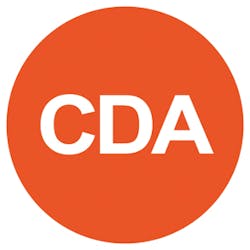CDA certification reaches 65-year milestone
Each year, thousands of dental assistants across the country earn or renew their certification through the Dental Assisting National Board, Inc. (DANB). Holding DANB’s Certified Dental Assistant (CDA) certification is a big achievement, and dental assistants nationwide proudly display their credentials after their name. There are numerous benefits to earning and maintaining DANB certification, including greater earning power, personal pride, employer recognition, and a professional advantage.
This year marked the 65th anniversary of CDA certification. But the history behind this national certification may not be well known. DANB certification traces back to nearly a century ago with the inception of the first dental assisting membership association — the American Dental Assistants Association (ADAA).
------------------------------------------------------
RELATED ARTICLES:
DANB salutes orthodontic assistants
DANB's social media links and tips
-------------------------------------------------------
The ADAA was founded in 1924 by Juliette A. Southard. For the next several years, the ADAA was hard at work, establishing state constituents, growing its membership numbers, and developing a national certification that would recognize the knowledge and professionalism of dental assistants across the country.
In 1948, the dream for dental assisting certification was realized. The association founded an affiliate certification board, called the American Dental Assistants Certification Board, Inc. — and the first CDA certifications were awarded later that year. These efforts were the building blocks for DANB’s CDA certification as we know it today.
An independent board
In 1980, the American Dental Assistants Certification Board became a separately incorporated organization and changed its name to the Dental Assisting National Board, Inc. Today, the ADAA and DANB are separate organizations, independent of each other, although they often collaborate.
The American Dental Association (ADA) has officially recognized DANB as the national certification board for dental assistants since 1989, when the recognition criteria for a national certification board for dental assistants were established.
Today, DANB offers four certifications for dental assistants:
- Certified Dental Assistant (CDA)
- Certified Orthodontic Assistant (COA)
- Certified Preventive Functions Dental Assistant (CPFDA)
- Certified Restorative Functions Dental Assistant (CRFDA)
Currently, there are more than 35,000 DANB certificants nationwide, and DANB certifications and certificates of knowledge-based competency are recognized or required in 38 states, the District of Columbia, the U.S. Air Force and the Department of Veterans Affairs.
“DANB offers certifications for dental assistants at many stages of their careers,” explains DANB Executive Director Cindy Durley, M.Ed., MBA. “We are proud of the growth our flagship CDA certification and of the new certifications we’ve developed over the years.”
To learn more about DANB exams and certifications, visit www.danb.org.
